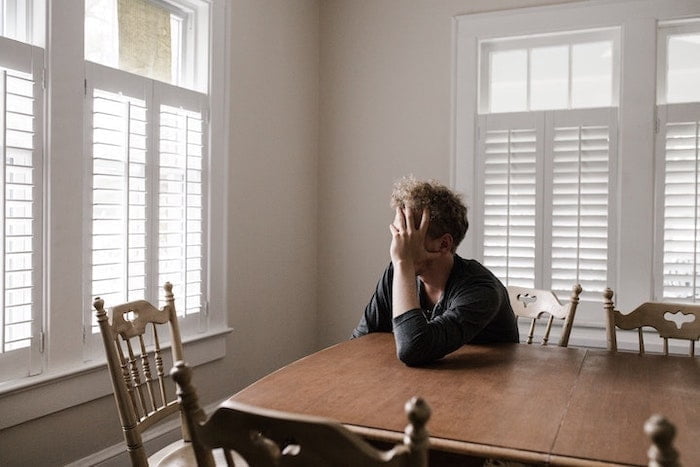Quick links for Bipolar Disorder
- What is bipolar disorder?
- Symptoms of bipolar disorder
- What causes bipolar disorder?
- Types of bipolar disorder
- Bipolar disorder combined with alcohol use disorder
- Treating bipolar disorder and alcohol use disorder
- References for bipolar disorder
Bipolar disorder and alcohol use disorder (AUD) are often co-occurring conditions.
Researchers are yet to understand exactly why people with bipolar disorder turn to alcohol and some believe that there may be some genetic factors, although more research is necessary to fully understand the link.
It is widely accepted, however, that because alcohol is legal and easily available, many people turn to it to self-medicate and alleviate their anxiety and depression.
What is bipolar disorder?

Man holding his head whilst talking about bipolar disorder
Bipolar disorder is a mental health condition that causes extreme mood swings.
A person suffering from bipolar disorder will often fluctuate between extreme highs of mania and hyperactivity to extreme lows of depression.
Contrary to popular belief, these intense mood swings do not change in an instant. More often, the intense feelings associated with bipolar disorder can last for several weeks at a time.
Symptoms of bipolar disorder

Person sat at a table thinking about bipolar disorder
Symptoms of bipolar disorder will differ depending on whether the person is feeling an intense high or an intense low.
Symptoms of hyperactivity and mania associated with bipolar disorder are:
- Excess energy
- Increased ambition and creative ideas
- Impulse buying things you would not normally buy or want
- Loss of appetite
- Less need for sleep
- Racing thoughts
- Irritability
- Talking very fast
- Increased appetite for things that bring pleasure, e.g., food, sex or alcohol
Symptoms of depression associated with bipolar disorder are:
- Feeling worthless
- Suicidal thoughts
- Low self-esteem
- Lack of energy
- Persistent low mood
- Trouble concentrating
- Poor sleep patterns
- Lack of interest in activities
- Forgetfulness
What causes bipolar disorder?

Two people having a serious conversation about bipolar disorder
Researchers believe that many factors contribute to the development of bipolar disorder. [1]
Two of the main factors associated are:
- Genetics: People with a parent with bipolar disorder are more likely to develop the condition themselves, however, this heightened risk is minimal. [2]
- Altered brain chemistry: Research suggests that there are some psychological and neurobiological differences in the brain chemistry of a person who suffers from bipolar disorder. [3]
Types of bipolar disorder

Therapist taking notes whilst speaking with a patient about bipolar disorder
Bipolar disorder varies in intensity and, when a person is diagnosed, they will also be told how severe their bipolar disorder is by the type they are diagnosed with.
The different types of bipolar disorder are:
Bipolar I Disorder
This is the most intense type of bipolar disorder and people with bipolar I disorder often have severe fluctuations in mood.
The manic episodes in someone with this type of bipolar disorder often last for up to 7 days and can result in in-hospital treatment.
Extreme depressive episodes follow manic episodes and can last up to two weeks.
Bipolar II Disorder
Someone suffering from bipolar II disorder will feel intense manic episodes, however, not quite as intense or severe as bipolar I disorder. A person with this type of bipolar disorder will not lose touch with reality but feel unable to control their emotions.

Patient and therapist discussing bipolar disorder
Cyclothymic disorder
Cyclothymia is a milder form of bipolar disorder that causes depressive and manic episodes that do not last as long and are not quite as intense as the previous two types of bipolar.
A person with this type of bipolar disorder will also have long periods of feeling normal between disruptive episodes.
Rapid cycling
Rapid cycling is diagnosed when a person suffers at least four manic or depressive episodes out of the blue within a year.
It can cause a person to suddenly feel as though they have lost all control of their emotions and they will spiral further out of control until the episode stops.
It can be several months before another episode begins again.
Unspecified bipolar disorder
Unspecified bipolar disorder is normally a sporadic combination of several of the above types of bipolar disorder.
The manic or depressive episodes follow no specific pattern and, as a result, this type of bipolar disorder can be much more difficult to diagnose.
Bipolar disorder combined with alcohol use disorder

Therapist and patient having a serious discussion about bipolar disorder
Alcohol use disorder is a common co-occurring condition alongside bipolar disorder. [4] As alcohol works as a depressant of the central nervous system, its sedating effects might be a welcome release for anyone suffering from a severe depressive or manic episode.
Alcohol can also intensify the feelings of mania in some sufferers, which could become increasingly appealing to some people.
The appealing aspects of alcohol cause a person suffering from bipolar to continue to turn to alcohol in a constant chase for how it makes them feel.
Unfortunately, however, to continue to feel the same effects of alcohol over time, a person will need to consume more alcohol in one session. This quickly spirals into an addiction.
Many medications that are routinely used to treat bipolar disorder have unpleasant side effects such as weight gain and sedation, [5] making them unappealing to many people who suffer from this disorder.
This can also heighten the chances that a person will turn to alcohol to alleviate their symptoms.
Although they may have a sore head and feel groggy the next day, those symptoms are much easier to cope with than the uncontrollable side effects of some medications.
While alcohol might produce a pleasant feeling among those with bipolar disorder, it can also intensify the symptoms of the illness and is not recommended by healthcare professionals.
Increased alcohol consumption can cause anyone to make rash and dangerous decisions and this risk is increased when the person is already suffering from bipolar disorder.
Treating bipolar disorder and alcohol use disorder

Two people sat in chairs discussing bipolar disorder at a drug and alcohol rehab clinic
Treating co-occurring conditions can be more difficult as it means tackling two or more issues at one time.
A person suffering from both bipolar disorder and alcohol use disorder will first have to detox the alcohol from their system and then find a balance of medication to treat any withdrawal symptoms they might experience, as well as the symptoms of the bipolar disorder.
It is important to let your healthcare provider know if you experience unpleasant side effects of the bipolar medication as you are less likely to stop taking a medication that does not make you feel unwell.
A local inpatient rehabilitation facility is the best option as you will have round-the-clock access to medical professionals who can help you through the often debilitating withdrawal symptoms of alcohol use disorder.
However, if this is not an option, detox can be done as an outpatient in which you will be prescribed medication to help with your symptoms and visit a facility for a check-up on set days.
You may also be referred for Cognitive Behavioural Therapy to help you address your thoughts and actions. CBT helps you change the way you think about things and the way you approach them. It is beneficial in helping people get over addictions by changing the approach they take towards negative thoughts.

People holding hands at a bipolar disorder support group
Peer support groups are a good way to keep on top of your addiction and can give you a network of people to lean on when you are having a tough time.
The people in the peer support groups will know exactly what you are going through and will be able to offer helpful advice and tips.
Many peer support groups such as 12-step programs also offer a mentoring service so that you will always have someone to contact if you are struggling.
Continuing with therapy such as CBT and attending peer support groups, as well as making sure you are taking your bipolar medication every day, will reduce your chances of relapsing and keep your moods stabilised so that you do not feel the need to turn to alcohol to overcome any intense emotions.
If you do feel overwhelmed or that you may spiral towards unhealthy patterns again, contact your healthcare provider as soon as possible or confide in someone from your peer support group to ensure you get the help you need before you relapse.
References for bipolar disorder
- https://www.nimh.nih.gov/health/publications/bipolar-disorder/
- https://www.ncbi.nlm.nih.gov/pmc/articles/PMC3966627/
- https://www.ncbi.nlm.nih.gov/pmc/articles/PMC3181872/
- https://www.ncbi.nlm.nih.gov/pmc/articles/PMC6683827/
- https://pubmed.ncbi.nlm.nih.gov/25533913/






